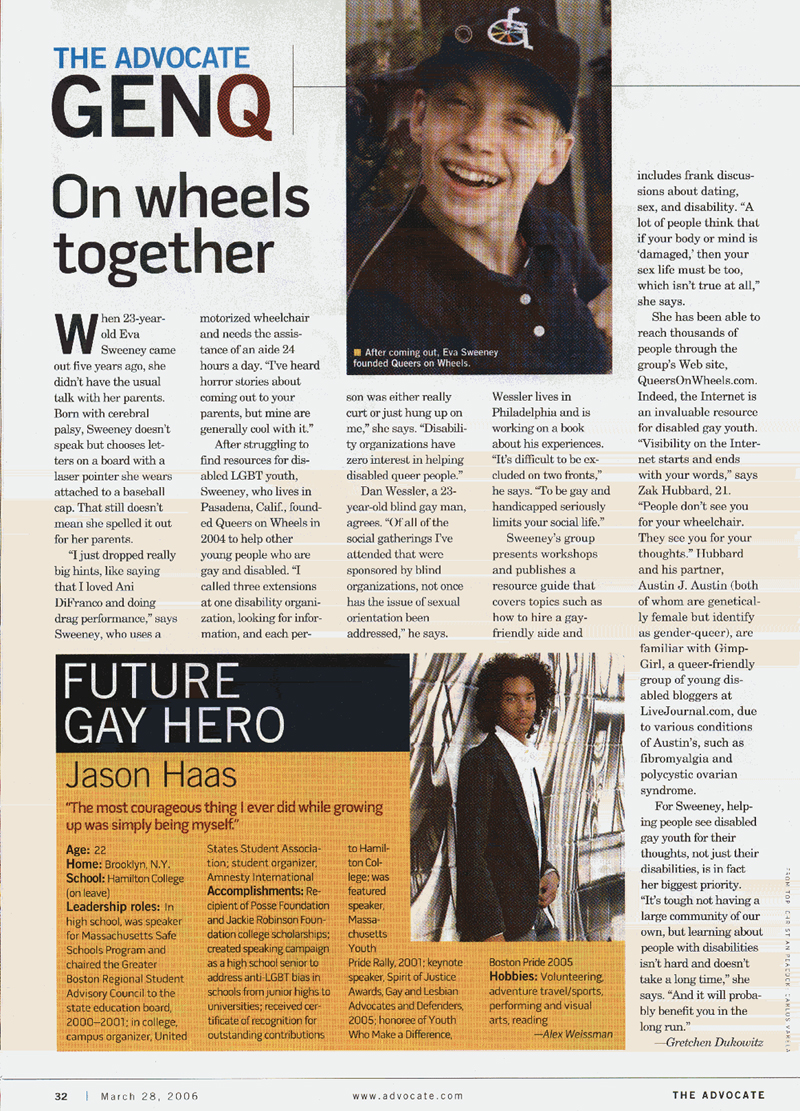
FULL TEXT VERSION OF ARTICLE: ON WHEELS TOGETHER
When 23-year-old Eva Sweeney came out five years ago, she didn't have the usual talk with her parents. Born with cereral palsy, Sweeney doesn't speak but chooses letters on a board with a laser pointer she wears attached to a baseball cap. That still doesn't mean she spelled it out for her parents.
"I just dropped really big hints, like saying that I loved Ani DiFranco and doing drag performance," says Sweeney, who uses a motorized wheelchair and needs the assistance of an aide 24 hours a day. "I've heard horror stories about coming out to your parents, but mine are generally cool with it."
After struggling to find resources for disabled LGBT youth, Sweeney, who lives in Pasadena, California, founded Queers on Wheels in 2004 to help other young people who are gay and disabled. "I called three extensions at one disability organization, looking for information, and each person was either really curt or just hung up on me," she says. "Disability organizations have zero interest in helping disabled queer people."
Dan Wessler, a 23-year-old blind gay man, agrees. "Of all the social gatherings I've attended that were sponsored by blind organizations, not once has the issue of sexual orientation been addressed," he says. Wessler lives in Philadelphia and is working on a book about his experiences. "It's difficult to be excluded on two fronts," he says. "To be gay and handicapped seriously limits your social life."
Sweeney's group presents workshops and publishes a resource guide that covers topics such as how to hire a gay-friendly aide and includes frank discussions about dating, sex, and disability. "A lot of people think that if your body or mind is 'damaged,' then your sex life must be, too, which isn't true at all," she says.
She has been able to reach thousands of people through the group's website, QueersOnWheels.com. Indeed, the internet is an invaluable resource for disabled gay youth. "Visibility on the Internet starts and ends with your words," says Zak Hubbard, 21. "People don't see you for your wheelchair. They see you for your thoughts." Hibbard and his partner, Austin J. Austin (both of whom are genetically female but identify as gender-queer), are familiar with Gimp-Girl, a queer-friendly group of young disabled bloggers at LiveJournal.com, due to various conditions of Austin's, such as fibromyalgia and polycystic ovarian syndrome.
For Sweeney, helping people see disabled gay youth for their thoughts, not just their disabilities, is in fact her biggest priority. "It's tough not having a large community of our own, but learning about people with disabilities isn't hard and doesn't take a long time," she says. "And it will probably benefit you in the long run."
-- Gretchen Dukowitz